The successful holding of the 1st Forum on Translation Technology and Language Service Talents Training & the Certificate Award Ceremony of SIT-RWS Training Base for “Dual-Talented” Teachers on December 3rd and 4th on four online broadcasting platforms, marked a milestone for cooperation between Shanghai Institute of Technology (SIT) and RWS.
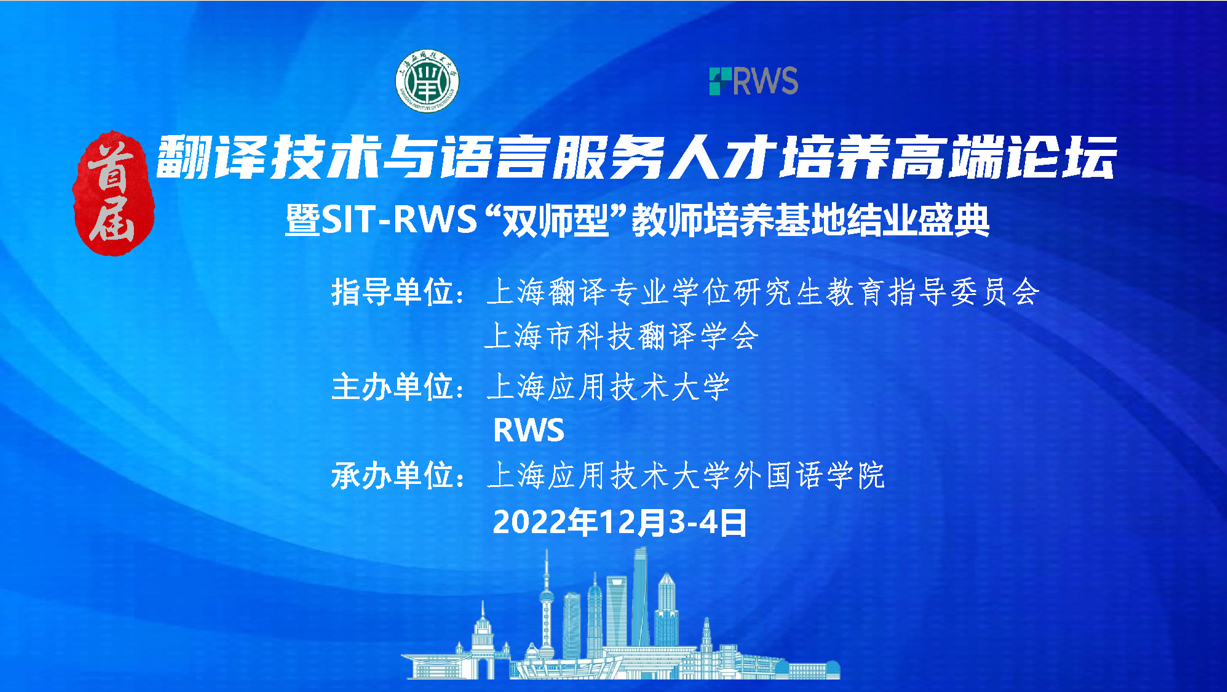
Industry experts from RWS, and 20 scholars from the University of Macau, Fudan University, Tongji University, Dalian University of Foreign Languages, Shanghai International Studies University, Shandong Normal University, Zhejiang University, University of International Business and Economics, Beijing Foreign Studies University and Beijing Language and Culture University got together online, exchanging views on translation technology and talent training programs driven by artificial intelligence, as well as on building up a team of Dual-Talented teachers. Ke Qinfei, Deputy Party Secretary and President of SIT, and Wang Ying, Deputy Party Secretary and Vice President, delivered speeches at the opening and closing ceremonies respectively. Special guests, such as Huang Youyi, former Deputy Director of China Foreign Languages Publishing Administration, Chai Mingjiong, Chairman of the Steering Committee for Shanghai Master of Translation and Interpreting (MTI) Postgraduate Education, and Hu Kaibao, Executive Vice President of Shanghai Science & Technology Translation Society, delivered speeches at the forum.
A total of 11 keynote reports in this forum, were broadcast live through four online platforms: CATTI, Language Service Video, Xiao’e-Tech and TTV, attracting as many as 98,000 viewers.
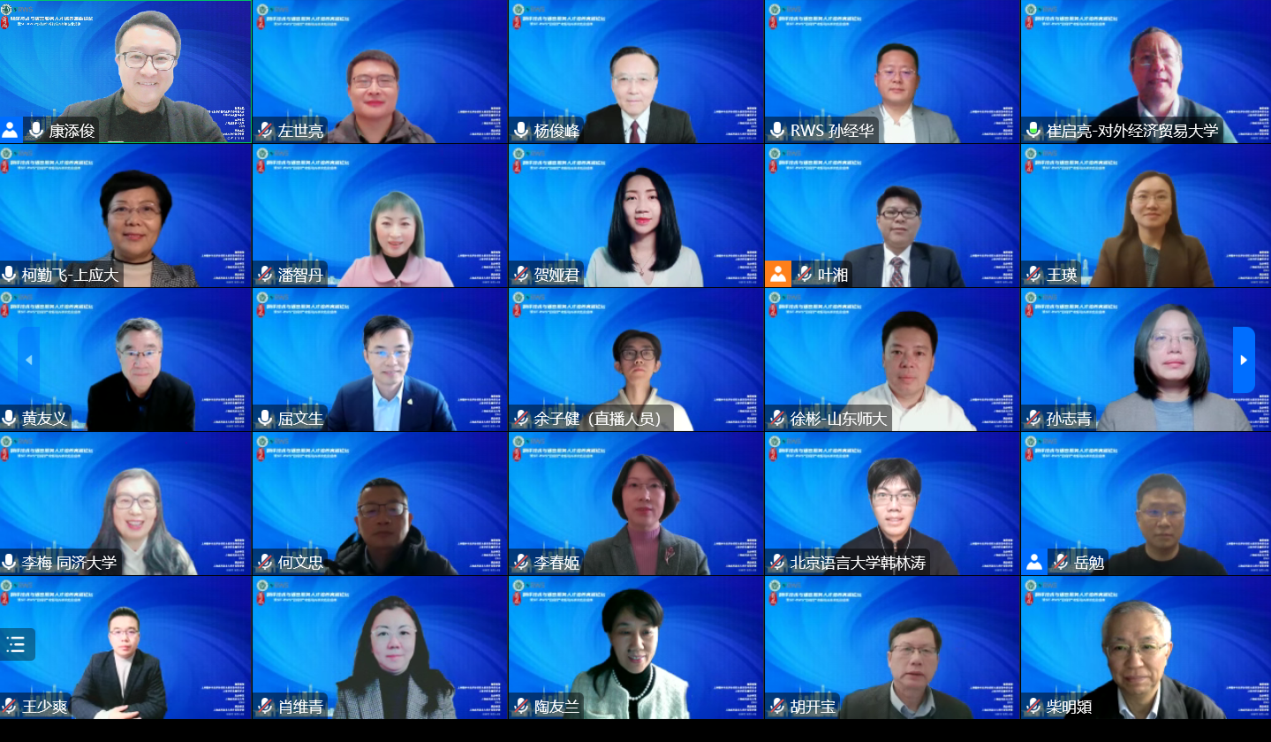
I. The Opening Ceremony
President Ke Qinfei extended a warm welcome to all the leaders, experts and guests attending the forum, and introduced the university’s philosophy, development model and achievements in her speech. Meanwhile, she affirmed a featured orientation of SIT’s School of Foreign Languages (SFL), that is, “application-driven and translation technology-empowered” foreign languages development. And she called on the SFLers to make an intellectual and practical contribution, by engaging in Shanghai’s development, spreading Chinese civilization to overseas, and telling well Chinese stories on the international arena, with various approaches, including strengthening integration of industry and education as well as school-enterprise cooperation, building up a team of Dual-Talented teachers proficient in translation technology, and applying language services to broader areas.
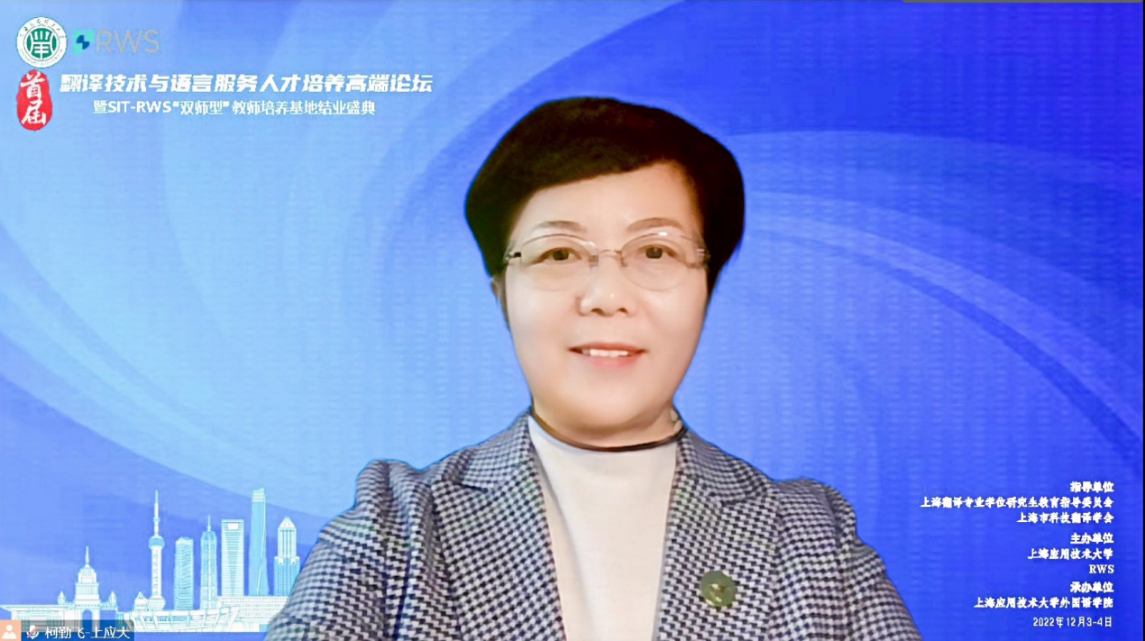
Ke Qinfei said that the 20th National Congress of the Communist Party of China had made an up-to-date deployment on education, science and technology, and talents, emphasizing the strategy of rejuvenating China with science and education and talents’ support for modernization. These new situations and new requirements had provided us with unprecedented policy support and rare historical opportunities to further accelerate the innovation and development of translation discipline. It is high time to train more Dual-Talented language service talents, proficient in translation technology, having a good understanding of contemporary China, and capable of articulating current values of China. It was hoped that new ideas, new horizons and new methods of translation would come out of this forum when experts and scholars exchanged their views. And it was expected that cultivating translation talents would go down to its development of the connotative meaning, initiating a new track of translation education.
As pointed out by Huang Youyi, “Different from ‘translation+law’ and ‘translation+communication’, ‘translation+technology’ is a new direction of MTI in the future, a fast lane and shortcut for the discipline of foreign languages to develop itself.” Huang stressed that it was necessary to open up an overseas translation platform for spreading Chinese civilization with a technical approach from a global perspective. Chai Mingjiong emphasized that a training pattern of language service talents with an integration of industry experience and textbook knowledge should have features of a specific industry, only in this way could language service talents from universities meet diverse social needs of specific industries. Hu Kaibao held that drastic changes had took place in technology innovation, research paradigm renewal and upgrading training patterns of language service talents, so the discipline of foreign languages could have a well-planned development thanks to new technologies.
II. Keynote Speeches
Sun Jinghua, Vice President of Sales in RWS China, put the foothold of translation education on mastering content management technology, that is, translators and interpreters should be capable to use Trados Enterprise to manage translation contents. And he also talked about a rising demand from enterprises for talents with compound capabilities and mastering translation technology, so there would be a brighter prospect for training and hiring these talents. Besides, Professor Li Defong from the University of Macau pointed out that creativity of translators and interpreters was one of the key components of translation technological competence, so cultivating creativity should take a significant role in translation education. What’s more, Professor Tao Youlan from Fudan University discussed textbooks and teaching concepts of English technical writing, based on a design concept in the textbook of Becoming a Technical Writer. She showcased how to improve students’ capabilities in English technical writing and have a better engagement in international communication in the new era.

Professor Li Mei from Tongji University analyzed challenges in training language service talents, and presented how her technology-driven localization team met market demands and how she expanded her teaching contents based on this team’s work. Associate Professor Wang Shaoshuang from Dalian University of Foreign Languages stressed that it was important to cultivate students’ machine translation literacy. And Professor Xiao Weiqing from Shanghai International Studies University and Professor Xu Bin from Shandong Normal University highlighted new technologies respectively, including how speech synthesis helped visually impaired people and how disruptive technologies such as machine translation and post-editing (MT+PE) assisted book translation. As for the talents training plan of He Wenzhong, Associate Professor from Zhejiang University, a breakthrough translation technology was to maximize functions of computer-aided software such as Trados.

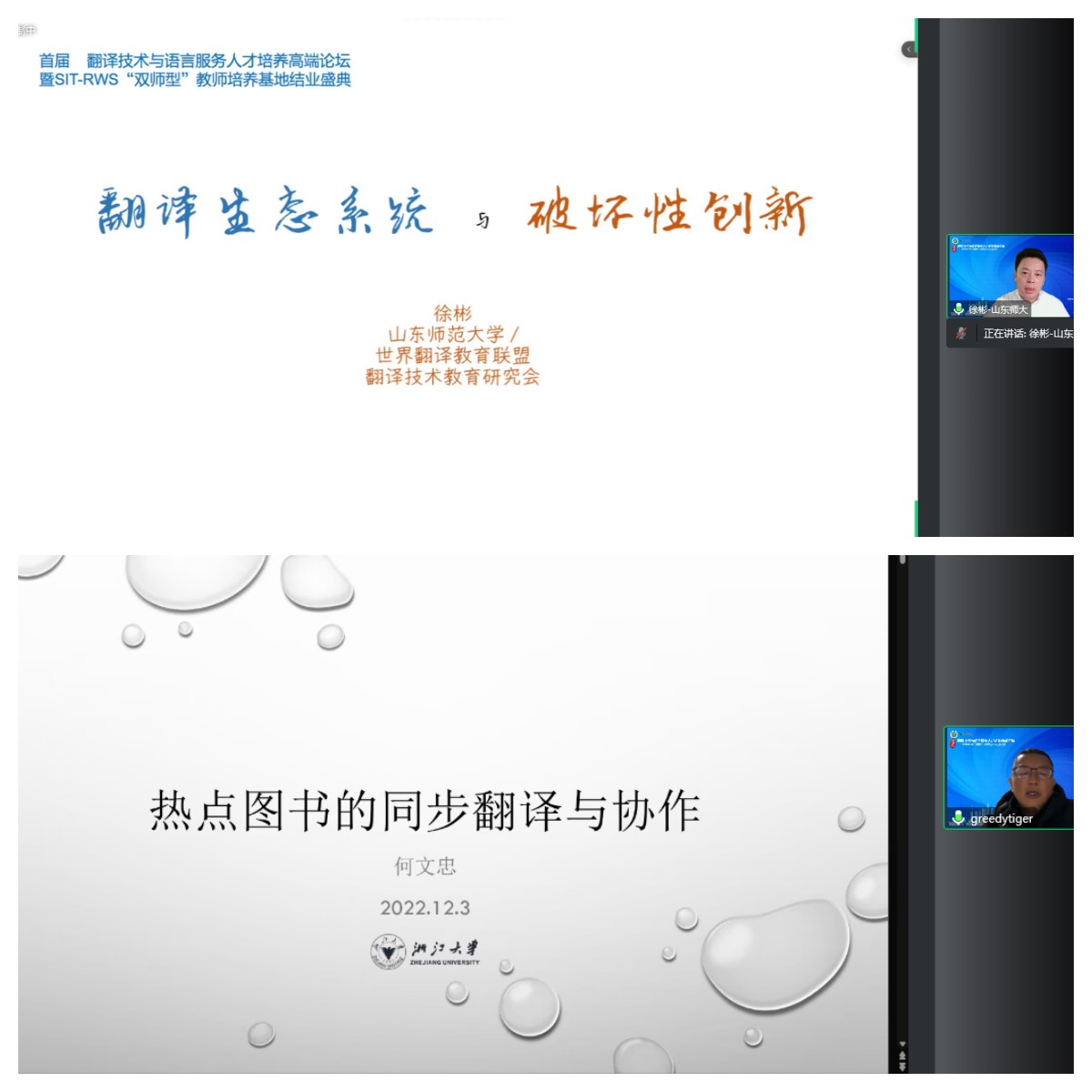
Han Ziman, Deputy Dean of the Corpus Research Institute of Shanghai International Studies University hosted the keynote speeches session on December 4th. Three experts, Cui Qiliang, Associate Professor from the University of International Business and Economics, Wang Huashu, Associate Professor from Beijing Foreign Studies University, and Han Lintao from Beijing Language and Culture University, exchanges their views on the current situation, development trends, opportunities, challenges and prospects of translation technology in the era of artificial intelligence, proposing an application-driven and interdisciplinary training pattern for language service talents, and discussed its development tracks, core contents and application effect.
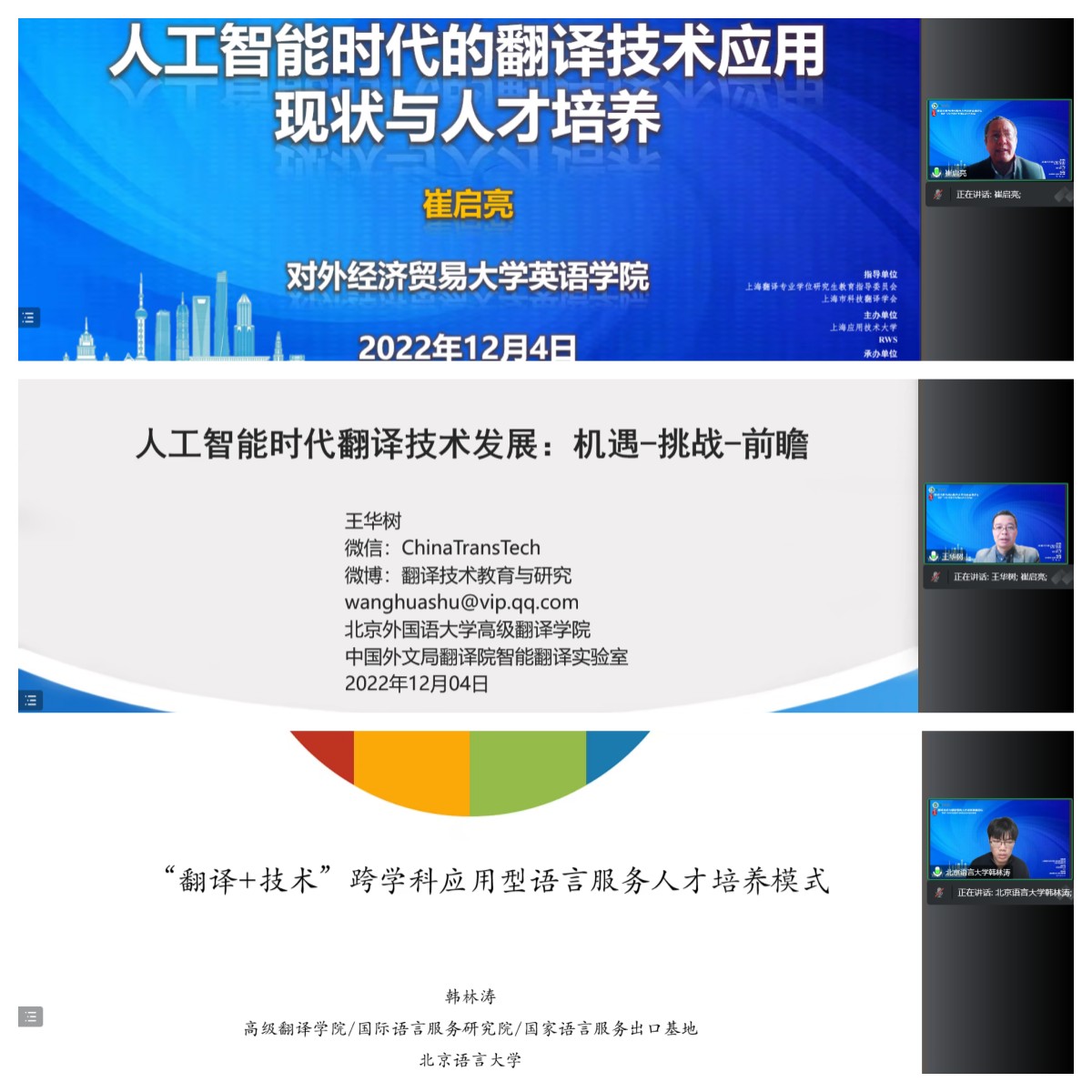
In addition, other respected hosts for different sessions of this forum included Yang Junfeng, former Vice President of Dalian University of Foreign Languages, Lan Hongjun, Dean of the School of Interpreting & Translation Studies of Guangdong University of Foreign Studies, and Qu Wensheng, Dean of the Graduate School of East China University of Political Science and Law.
III. The Certificate Award Ceremony
Li Chunji, Dean of the School of Advanced Translation & Interpretation of Dalian University of Foreign Languages, presided over the Certificate Award Ceremony for SIT-RWS Training Base for “Dual-Talented” Teachers. And He Yajun, Director of Education Division of RWS Greater China, read out a list of certificate awardees. After that, Wang Jianmei, head of RWS Asia Pacific Technical Support Team, made a summary speech on the training, highly appraising trainees from SFL, who successfully shifted their roles from teachers into trainees in this program, and spared no efforts in learning know-how of Trados and in passing exams for certificates. As a representative of all trainees, Ye Xiang from Shanghai Institute of Technology, delivered a speech, sharing his experience of applying what he had learned in this training program to his teaching and academic writing for the purpose of course reform and improvement.
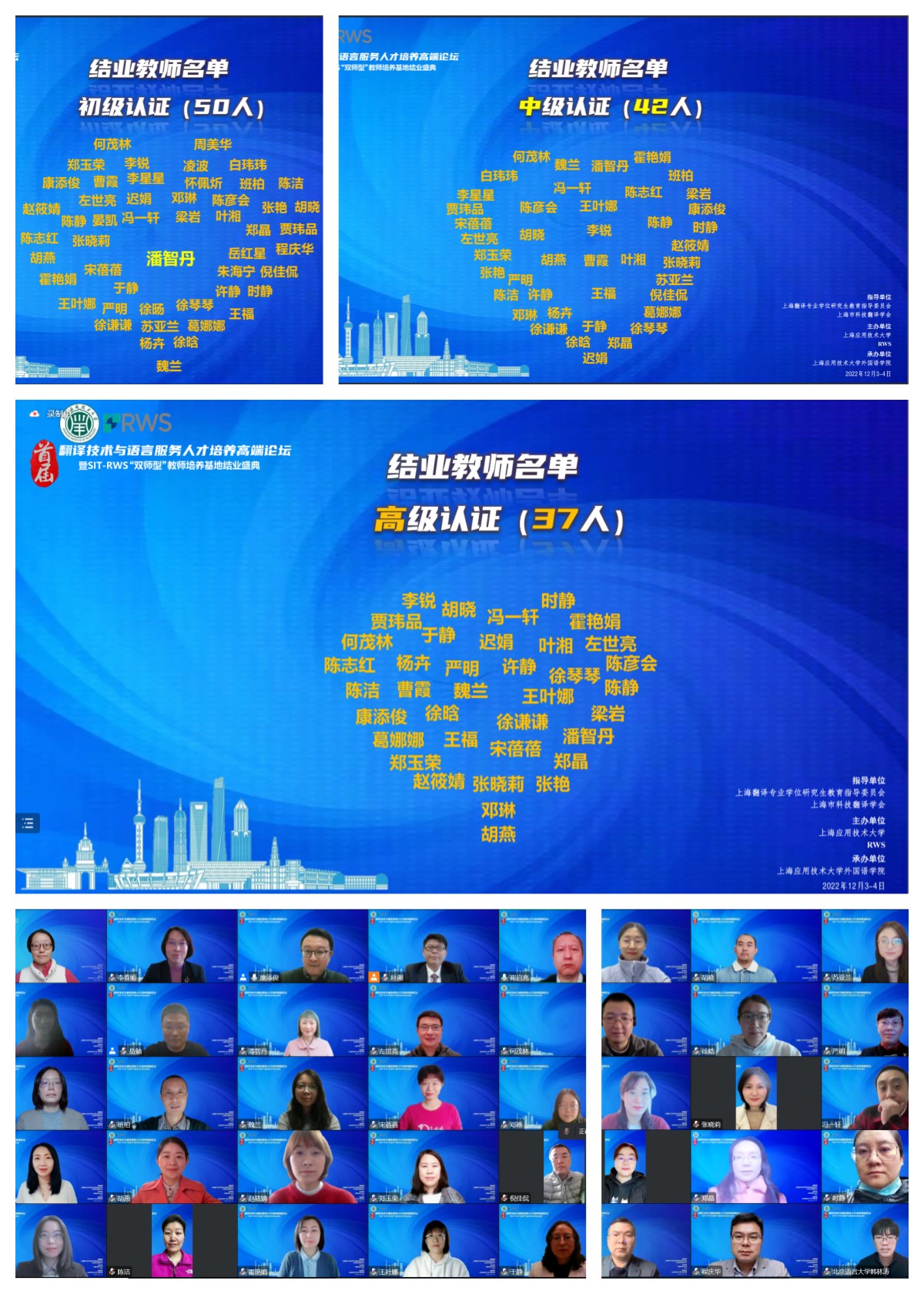
IV. The Closing Ceremony
Sun Zhiqing, Vice Dean of SFL of Shanghai Institute of Technology, hosted the closing ceremony. And Pan Zhidan, Dean of SFL, made a concluding speech for this forum. On behalf of the organizer of this forum, Pan once again paid tribute and gratitude to all the experts and scholars participating in this forum. She also made a brief summary on 11 thought-provoking keynote speeches with 6 key phrases, such as Intellectual and Practical Contribution, Technology Empowering translation, Featured Systems for Training Talents with Characteristics, Translation Education Compatible with Cultivating Specific Capabilities, Impact of Breakthrough Translation Technology on Talents Training, as well as How Artificial Intelligence Promoting Translation Development towards New Liberal Arts Education. This forum not only brought together renowned scholars engaging in translation education and translation technology in China, but also attracted nearly 100,000 viewers, a super-large fan group of translation technology. Now the SFL is eagerly looking forward to holding a second forum for a second round of get-together, and for making greater glories.
Wang Ying, Deputy Party Secretary and Vice President of SIT, delivered a closing speech at the ceremony. Time and again, she expressed sincere gratitude to 21 prominent guests and experts for their wonderful academic and intellectual nourishment in this forum. Meanwhile, she congratulated all the certificate awardees from SIT-RWS Training Base for “Dual-Talented” Teachers.

This forum was well supported by five influential WeChat official accounts, including Headlines Today, Translation Learning Community, Trados, CATTI Center and Language Service Industry, as well as the website of Translation Institute of China Foreign Languages Publishing Administration.
Now SIT has joined hands with RWS, a leading company in its industry, to establish SIT-RWS Training Base for “Dual-Talented” Teachers to make a partial achievement in reforming SIT’s teaching with an aim of New Liberal Arts education. Besides, this joint base is also another new attempt to deepen integration of industry and education, collaborative innovation and a deep cooperation between schools and enterprises. It is highly expected that all the teachers should continue to strength their educating capabilities, undertaking a glorious mission of training application-driven and professional translators urgently needed by China, and shouldering great responsibilities of telling well Chinese stories and letting Chinese voices heard around the world.